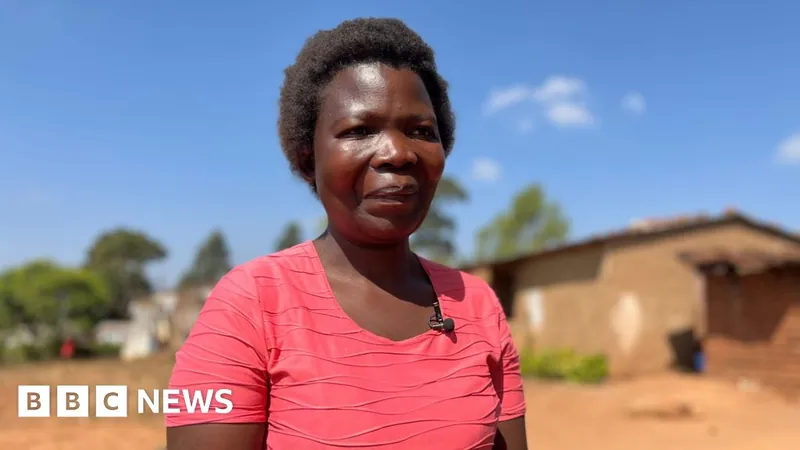
A Mother's Battle: Discovering Cervical Cancer During Pregnancy and the Fight for Better Treatment in Malawi!
2024-10-08
Author: Jia
Dorothy Masasa, a spirited 39-year-old mother from the Thyolo district of southern Malawi, strolled down a dirt road with joy written all over her face, her baby snugly secured on her back. Just six months earlier, she was in a hospital in Kenya, courageously undergoing radiotherapy for a life-threatening diagnosis.
In a country where medical technology is often hard to come by, Malawi recently celebrated its introduction of advanced cancer treatment machines. This pivotal development means that more women battling cancer can receive treatment within their own borders, reducing the need for nerve-wracking travels abroad for care.
Dorothy's health journey took a shocking turn when, at just 13 weeks into her pregnancy, she was diagnosed with cervical cancer. “I was told that undergoing treatment while pregnant is a precarious situation,” she recalled. Faced with agonizing choices, the doctors presented her with two options: surgery to remove the cancer, which would sadly terminate her pregnancy, or chemotherapy, which posed risks of disabilities for her unborn child. Dorothy chose chemotherapy, hoping to protect her baby, and ultimately gave birth to a healthy child via Cesarean section before proceeding with surgery to remove her uterus.
Before her diagnosis, Dorothy experienced severe cramping in her lower abdomen, unusual bleeding, and persistent foul-smelling discharge. Initially misdiagnosed as a sexually transmitted infection, it soon became apparent that her symptoms were far more serious.
Despite her brave decisions, the fight was far from over. Dorothy required further treatment that was not available in Malawi until recently. She was one of 30 women selected by the aid organization Médecins Sans Frontières (MSF) to travel to Nairobi, Kenya for specialized radiotherapy. It was a daunting experience for Dorothy, marking her first airplane ride, and she was understandably hesitant to leave her newborn behind. Nevertheless, she found strength in the thought of returning home healthy and vibrant.
While recovering, Dorothy faced the harsh realities of cancer treatment: she lost weight and her hair, leaving her frail but resilient. She was among 77 patients airlifted from Malawi to Kenya since 2022 for cervical cancer treatment, highlighting the pressing need for accessible healthcare in her home country.
Cervical cancer remains a critical health issue worldwide, recognized as the fourth most common cancer among women, with around 660,000 new cases and 350,000 deaths reported in 2022, as per the World Health Organization (WHO). Alarmingly, most of the 20 nations with the highest cervical cancer rates in 2018 were located in Africa, primarily due to insufficient access to HPV vaccines, screening, and timely treatments that often result in advanced-stage diagnoses.
At the Queen Elizabeth Central Hospital (QECH), the largest public healthcare facility in Malawi, patients suffering from cervical cancer flood in from across the nation. Dr. Samuel Meja, an obstetrician and gynecologist there, points out the alarming epidemic: “Poor access to screening and the rampant HIV crisis in sub-Saharan Africa have exacerbated the issue.” In 2018, Malawi held the unfortunate title of having the second-highest cervical cancer rate in southern Africa, following Eswatini.
As Dorothy rises from her treatment, she symbolizes hope and ongoing progress in the battle against cancer in Malawi. Her story illustrates not only the personal struggles of patients but also the urgent need for comprehensive cancer care and prevention measures to protect future generations of women. With heroes like Dorothy paving the way, there's an awakening call for improved healthcare policies and resources that could change the narrative of cancer care in Malawi forever!



 Brasil (PT)
Brasil (PT)
 Canada (EN)
Canada (EN)
 Chile (ES)
Chile (ES)
 España (ES)
España (ES)
 France (FR)
France (FR)
 Hong Kong (EN)
Hong Kong (EN)
 Italia (IT)
Italia (IT)
 日本 (JA)
日本 (JA)
 Magyarország (HU)
Magyarország (HU)
 Norge (NO)
Norge (NO)
 Polska (PL)
Polska (PL)
 Schweiz (DE)
Schweiz (DE)
 Singapore (EN)
Singapore (EN)
 Sverige (SV)
Sverige (SV)
 Suomi (FI)
Suomi (FI)
 Türkiye (TR)
Türkiye (TR)